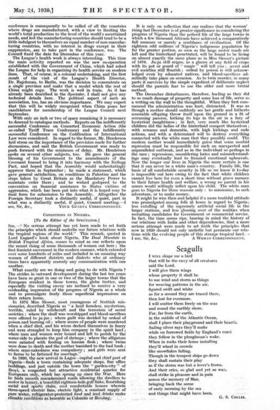CONDITIONS IN NIGERIA.
[To the Editor of the SphaT.A.i on.]
Sut,—“ No serious attempt has yet been made to set forth the principles which should underlie our future relations with the tropical regions of the world." This remark, quoted in Lord Lugurd's book about Nigeria, The Dual Mandate in British Tropical Africa, comes to mind as one reflects upon the recent rising ,of some thousands of women out here ; the first feminist movement in the modern manner, which extended over some hundreds of miles and included in an anriazing way women of different districts and dialects who at ordinary times have apparently scarcely any communication with one another.
What exactly are we doing and going .to do with Nigeria ? The strides in outward development during the last ten years . . have been so great in one or two of the larger towns that the European resident in thoSe towns, the globe trotter, and especially the visiting envoy are inclined to receive a very misleading impression of the progress of Nigeria as a whole and to promulgate freely those superficial impressions on their return home. ,
In 1876 Miss Slessor, most courageous of ' Scottish mis- sionaries, described Nigeria as " a land formless, mysterious, terrible, ruled by witchcraft and the terrorism of secret societies ; where the skull was worshipped and blood-sacrifices were offered to ju-jus ; where guilt was decided by ordeal of poison. and burning oil • where scores of people were murdered when a chief died, and his wives decked themselves in finery and were strangled to keep him company in the spirit land - where men and women were bound and left to perish by the water-side to placate the god of shrimps ; where the alligatois were satiated with feeding on human flesh ' • where twins were done to death and the mother banished to the bad bush ; where semi-nakedness was compulsory ; and girls were sent to farms to be fattened for marriage. In 1930, the new arrival in Lagos-capital and chief port of Nigeria—finds a town containing adequate shops, fine office buildings, and just outside the town the " garden-city " of Ilcoyt, a congested but attractive residential quarter for Europeans only, which has sprung up since the War. Here he finds smooth macadainized roads allowing the dwellers to motor in luxury,, a- beautiful eighteen-hole golf links,: flourishing social and sports clubs, cool comfortable houses wherein three-speed electric fans, electric light, a constant supply of pure water, refrigerator-protected food and iced drinks make climatic conditions as bearable as tolornbb or Bon !bait:
It is only on reflection that one realizes that the woman' rising last December is of greater significance in considering the progress of Nigeria than the policed life of the large towns in which a few thousand Africans have achieved a comparatively full measure or merely a semblance of civilization. Of the eighteen odd millions of Nigeria's indigenous population by far the greater portion, as soon as the large motor roads are left and the hinterland penetrated, will be found to be -living On almost exactly the same plane as in Miss Slessor's picture of 1876. Jit-ju still reigns, as a glance at any field of crops with its pot or gourd of magic will tell you ; secret and evil societies still flourish ' • ordeal by poison is still acknow- ledged - eVeif hy educated natives, and blood-sacrifices ad- Mittedly take place on occasion. As to twin murder, in many parts it survives by the simple expedient of deliberate neglect should the parents fear to use the older and more brutal method.
The December disturbances, therefore, leading as they did to so much damage of property and some loss of life, serve as a writing on the wall to the thoughtful. When they first com- menced the administration was hurt, distracted. It was as though a mother should suddenly see her gentle and hitherto amenable offspring throw itself upon the ground in a fit of screaming passion, kicking its legs in the air in a fury of hysterical naughtiness ; in fact, very much like hysterical children did the ladies of the hinterland comport themselves ; with screams and dementia, with high kickings and rude actions, and with a determined will to destroy everything connected with the white man that they possibly could. The modern mother would immediately guess that some morbid repression must be responsible for such an unexpected and unparalleled outbreak, and as in the individual so perhaps in the race ; repressions, smouldering hates and misunderstand- ings may eventually lead to frenzied emotional upheavals. Now the longer one lives in Nigeria the more certain is one that it can never be a white man's country. Family life, the basis of all comfortable security in life as we know it to-day is impossible out here owing to the fact that white children cannot live here for even a short time without grave menace to their future health and welfare, a wrong no parent in his senses would willingly inflict upon his child. The white man goes to Nigeria for three reasons only : to missionize, to seek adventure, or to make money.
It might be wise then and helpful if a more truthful attitude was promulgated among folk at home in regard to Nigeria; less extolling of the supremely artificial social life in the larger- stations, and less glossing over of the realities when recruiting- candidates =for Government or commercial service. In fact, the time seems ripe, bearing in mind the history of our relations with India and other dependencies, that a more serious attempt were made to set forth the principles that now in 1930 should not only underlie but permeate our rela- tions with the evolving people of this strange tropical land.- –






































 Previous page
Previous page